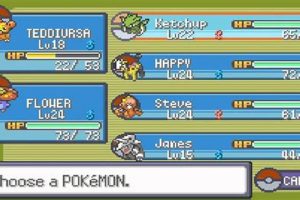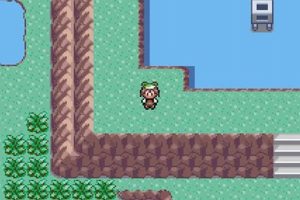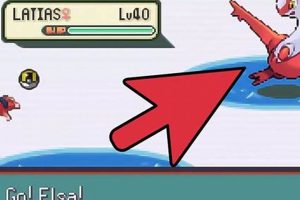In the realm of Pokemon Emerald, a specific instance of unintentional or humorous text, often arising from translation quirks, programming errors, or creative localization choices, has captured the attention of players. An example might involve a character delivering dialogue that, due to awkward phrasing or context, elicits laughter. These textual anomalies stand out within the game’s otherwise carefully crafted narrative.
The significance of such occurrences lies in their ability to enhance the overall player experience. These unexpected moments of levity can foster a sense of community among players who share and discuss their discoveries. Furthermore, they contribute to the game’s lasting appeal and its status as a memorable entry in the Pokemon series. Historically, these peculiar phrases have been documented and celebrated within online forums and fan communities, becoming a unique aspect of the game’s legacy.
The ensuing discussion will delve into specific examples and the cultural impact of this linguistic phenomenon within the context of Pokemon Emerald. This exploration will consider the various factors contributing to their creation, including the original Japanese text, translation processes, and the reception from English-speaking audiences.
Tips Regarding Peculiar Textual Elements in Pokmon Emerald
This section offers guidance on identifying, appreciating, and analyzing unusual phrases and dialogues found within the English version of Pokmon Emerald.
Tip 1: Recognize Potential Sources. Be aware that unexpected or comical text can arise from various sources, including translation errors, programming bugs, or deliberate attempts at humor by the localization team.
Tip 2: Contextualize the Dialogue. Consider the character’s personality, the surrounding events, and the overall tone of the scene when evaluating a potentially humorous phrase. A seemingly odd statement might be intentional within the narrative.
Tip 3: Examine the Original Japanese Text (If Possible). Comparing the English translation with the original Japanese script can reveal the root of any humorous discrepancies. Online resources may offer comparative analyses.
Tip 4: Consult Online Communities. Explore online forums, wikis, and social media groups dedicated to Pokmon Emerald. These platforms often contain discussions and analyses of notable textual anomalies.
Tip 5: Document and Share Findings. If encountering a particularly noteworthy phrase, capture a screenshot or record a clip and share it with the online community. This helps to preserve and celebrate these unique moments.
Tip 6: Analyze the Linguistic Impact. Consider how the unusual phrasing affects the player’s understanding and enjoyment of the game. Does it enhance the experience, or does it detract from the narrative?
Tip 7: Consider the Cultural Context. Certain phrases may be humorous due to their specific cultural references or idioms. Understanding these contexts can deepen the appreciation of the intended or unintended humor.
By applying these tips, players and researchers can gain a deeper understanding of the role and impact of idiosyncratic language within Pokmon Emerald, transforming a simple observation into a more nuanced analysis.
The subsequent sections will further explore specific examples and their lasting effects on the game’s reception and legacy.
1. Translation Quirks
Translation quirks represent a significant origin for unintentional humor within the English version of Pokemon Emerald. The process of translating Japanese text into English inevitably introduces alterations, as direct word-for-word conversions are often ungrammatical or nonsensical in the target language. These deviations from the original source material, arising from linguistic differences and the need for cultural adaptation, can inadvertently produce phrases and sentences that are perceived as funny. The influence is not always detrimental; it can add a layer of charm or memorability to the game.
One example of a possible translation quirk might involve a character’s dialogue regarding a specific item or location. If the original Japanese phrasing carries a nuance lost in translation, the resulting English sentence could appear awkward or amusing. Such instances highlight the challenges of conveying complex cultural references and idiomatic expressions across linguistic boundaries. The importance is underscored when evaluating fan theories and online discussions; these translation quirks are used as evidence.
Understanding the role of translation quirks provides players and researchers with a framework for interpreting humorous moments within the game. It encourages a critical analysis of the text, acknowledging the potential for misinterpretations and appreciating the complexities of cross-cultural communication. Recognizing translation quirks allows for a more informed understanding of the creative and linguistic processes involved in adapting a Japanese game for an English-speaking audience. Further study can reveal even more instances and insight within the text.
2. Localization Choices
Localization choices in Pokemon Emerald directly influence the presence and perception of humorous textual elements. Decisions made during the adaptation of the game for English-speaking audiences, aimed at cultural relevance and market appeal, occasionally result in unintended comedic outcomes. These instances showcase the complexities of translating not just words, but also cultural nuances and intended tone.
- Deliberate Humor Insertion
Localization teams may introduce jokes or humorous references not present in the original Japanese version to resonate with Western audiences. This insertion, while intended to enhance enjoyment, can sometimes fall flat or clash with the game’s overall tone, producing an unintended humorous effect due to awkward delivery or cultural misunderstanding. For example, an attempt to use a contemporary slang term might become outdated or irrelevant, leading to player amusement.
- Idiomatic Adaptation
Adapting Japanese idioms and expressions into English equivalents poses significant challenges. A direct translation often yields nonsensical phrases, prompting localization teams to find analogous expressions. However, the chosen English idiom may carry unintended connotations or be applied in an inappropriate context, resulting in humorous incongruity. Consider an idiom related to strength or determination; a poor English equivalent could create a comical situation due to its inappropriate application.
- Character Personality Tweaks
Localization can involve modifying character personalities to better suit Western sensibilities. Altering a character’s dialogue or mannerisms, while intended to improve relatability, can inadvertently create humorous situations if the changes are inconsistent or exaggerated. For instance, a character intended to be serious might deliver dialogue that is perceived as unintentionally comical due to its altered tone or vocabulary.
- Censorship and Content Modification
In some cases, localization involves censoring or modifying content deemed inappropriate for certain audiences. These alterations, while intended to comply with cultural norms, can sometimes result in humorous outcomes due to awkward phrasing or illogical plot developments. A censored dialogue exchange might become unintentionally funny due to the ambiguity or absurdity of the remaining text.
These localization choices, whether intentional or unintentional, contribute significantly to the presence of unanticipated humor within Pokemon Emerald. The interplay between linguistic adaptation, cultural sensitivity, and creative interpretation shapes the overall player experience, often resulting in moments of levity derived from the game’s unique textual landscape. The consequences of a poor localisation could turn serious story beats into comedy ones.
3. Programming Errors
Programming errors, an inherent aspect of software development, can manifest as unexpected text within Pokemon Emerald, frequently contributing to unintentionally humorous moments. These errors, ranging from minor typographical mistakes to more significant code-related issues, can alter intended dialogue, create nonsensical sentences, or produce bizarre character interactions. The ensuing discussion explores specific facets of these errors and their impact on the game’s textual landscape.
- Typographical Errors
Simple typographical errors, such as misspelled words or incorrect punctuation, can inadvertently alter the meaning of a sentence or create an amusing juxtaposition. A misplaced comma or a letter transposition can transform a serious statement into a comical one. While often minor, these errors contribute to the overall sense of unpredictability and charm that players associate with the game’s idiosyncratic language. For example, “Let’s battle!” becoming “Lets battle!” due to missing apostrophe.
- Text Buffer Overflow
A text buffer overflow occurs when the amount of text exceeds the allocated space within the game’s memory. This can result in truncated sentences, garbled text, or the display of unintended characters. This phenomenon can produce nonsensical or surreal dialogue, adding to the game’s unintentional humor. An example could involve a character’s lengthy speech being cut off mid-sentence, leading to an abrupt and comical conclusion.
- Variable Misassignment
Variable misassignment involves the incorrect association of a variable with a specific text string or dialogue option. This can lead to characters uttering dialogue that is inappropriate for the context or displaying text that is entirely unrelated to the current situation. For example, a non-player character (NPC) might unexpectedly deliver a line of dialogue intended for a different character or scene, creating a bizarre and humorous interaction.
- Conditional Logic Errors
Conditional logic errors involve flaws in the game’s programming that dictate when specific text strings or dialogue options are displayed. These errors can result in characters uttering dialogue that is inconsistent with their personality or the storyline, or in triggering unexpected text boxes. For instance, a character might thank the player for completing a task that has not yet been undertaken, leading to a nonsensical and humorous exchange. These errors lead to more confusion.
These programming errors, while unintentional, contribute to the unique textual character of Pokemon Emerald. From simple typos to complex logical flaws, these issues generate moments of unexpected humor, enhancing the game’s appeal and memorability. The interplay between code and text highlights the intricate relationship between software development and narrative design, demonstrating how even minor errors can have a significant impact on the player experience.
4. Unintended Humor
In Pokemon Emerald, unintended humor arises from a confluence of factors, resulting in amusing textual anomalies. These instances, often unexpected and inconsistent with the game’s intended tone, stem from translation quirks, localization choices, and programming errors. This analysis focuses on how these elements coalesce to produce unintended humor within the game’s narrative.
- Mistranslations and Literal Interpretations
Direct translations from Japanese to English can inadvertently create humorous phrases due to linguistic and cultural differences. A literal interpretation of an idiom or expression might result in a nonsensical or comical statement. These mistranslations can transform serious dialogue into an amusing exchange, impacting the player’s perception of the narrative. For instance, an attempt to directly translate a complex Japanese proverb may result in an English phrase that is grammatically correct but contextually absurd.
- Contextual Misapplication of Text
Programming errors or logic flaws can lead to the misapplication of text, resulting in characters uttering dialogue that is inappropriate for the situation. This contextual mismatch can create moments of unintended humor, particularly when serious characters deliver comical lines or when dialogue contradicts the unfolding events. An example could be a character offering condolences when the player has achieved a significant victory.
- Awkward Phrasing and Dialogue Delivery
Localization choices aimed at adapting the game for Western audiences can sometimes result in awkward phrasing or unnatural dialogue delivery. Attempts to incorporate contemporary slang or humor can backfire, leading to lines that are perceived as forced or comical. This is an issue when characters use slang that’s already out of date, or if their expression doesn’t fit their established personality, causing players to laugh.
- Unexpected Juxtaposition of Tone and Content
A sudden shift in tone or an incongruous combination of serious content and comical dialogue can generate unintended humor. This juxtaposition might arise from programming errors that trigger incorrect text strings or from localization choices that misjudge the audience’s sensibilities. For example, a character might deliver a somber monologue immediately followed by a nonsensical line, creating a jarring and humorous effect.
These facets highlight the complex interplay between translation, programming, and localization in generating unintentional humor within Pokemon Emerald. Such moments, while not originally intended by the game developers, contribute to the game’s unique appeal and memorability. The exploration of these elements provides insight into the challenges of adapting a game for diverse audiences and the unexpected consequences of linguistic and technical imperfections.
5. Community Reception
Community reception forms a critical component in the lifecycle and enduring impact of unintentionally humorous text within Pokmon Emerald. The discovery and propagation of these phrases are heavily reliant on player engagement, online forums, and social media platforms. Without community interaction, isolated instances of textual anomalies would likely remain unnoticed and uncelebrated, thus failing to achieve the status of memorable or iconic elements within the game. The circulation of screenshots, videos, and anecdotes related to these instances fuels their recognition and integration into the broader Pokmon fandom.
The community’s role extends beyond mere identification and sharing. Players actively analyze and interpret the potential origins of these phrases, attributing them to translation errors, localization choices, or programming glitches. This collaborative investigation enhances understanding of the underlying processes involved in game development and adaptation. Furthermore, the creation of memes, fan art, and parodies based on these phrases solidifies their cultural significance within the Pokmon community. Examples include dedicated threads on online forums dissecting specific lines, YouTube videos showcasing humorous moments, and fan-created artwork incorporating these phrases into the game’s visual aesthetic.
In essence, community reception transforms isolated textual anomalies into shared experiences and cultural touchstones. This collective engagement ensures that these unintentional humorous moments are not merely fleeting errors but enduring aspects of the game’s legacy. Understanding this dynamic provides developers and localization teams with valuable insight into how seemingly minor imperfections can resonate with players and contribute to a game’s overall appeal and longevity.
6. Legacy Significance
The enduring presence of unintentionally humorous text in Pokmon Emerald contributes significantly to the game’s legacy, shaping its identity within the broader Pokmon franchise. These instances, born from translation quirks, programming errors, and localization choices, transcend mere imperfections and become integral to the game’s lasting appeal and memorability.
- Community-Driven Preservation
Online communities play a pivotal role in preserving and amplifying the legacy of these phrases. Fan-created wikis, forums, and social media groups document and celebrate these moments, ensuring their accessibility for future generations of players. This collective effort transforms ephemeral glitches into enduring aspects of the game’s cultural footprint. An example of this process is the dedicated cataloguing of humorous dialogues on Bulbapedia or the sharing of funny screenshots on Reddit’s r/Pokemon community.
- Meme Culture Integration
The adoption of unintentionally humorous phrases into meme culture extends their reach beyond the immediate Pokmon fanbase. These phrases become repurposed and disseminated across diverse online platforms, gaining new layers of meaning and relevance. This phenomenon solidifies their place in internet history and reinforces their association with Pokmon Emerald. A clear example is using the poorly translated sentences as reaction images and running jokes across multiple platforms.
- Influence on Subsequent Games
The recognition and celebration of these humorous moments can influence design choices in subsequent Pokmon titles. Developers might deliberately incorporate similar instances of unintentional humor or self-aware references to past glitches, acknowledging the community’s appreciation for these anomalies. This creates a sense of continuity and demonstrates the developers’ awareness of the fan base’s unique preferences. An example might be a character making a self-referential joke about common Pokmon mishaps.
- Enhanced Nostalgic Value
For many players, these humorous phrases become intertwined with their personal experiences of playing Pokmon Emerald. They evoke feelings of nostalgia and contribute to the game’s emotional resonance. These instances serve as reminders of a specific era in gaming and enhance the game’s value as a cultural artifact. Recalling a funny mistranslation during gameplay can evoke a sense of shared memory and camaraderie amongst veteran players.
The combination of community-driven preservation, meme culture integration, influence on subsequent games, and enhanced nostalgic value demonstrates the profound impact of unintentionally humorous text on Pokmon Emerald’s legacy. These phrases, initially born from error, evolve into cherished elements of the game’s identity, solidifying its place in the history of video games. Further study into individual instances may reveal greater nuance in this phenomenon.
Frequently Asked Questions
This section addresses common inquiries regarding the presence and significance of unintentionally humorous text within the English version of Pokmon Emerald.
Question 1: What specific factors contribute to the presence of “funny word in pokemon emerald”?
Instances of unintended humor arise from a combination of translation quirks stemming from linguistic differences between Japanese and English, localization choices made to adapt the game for Western audiences, and programming errors that affect text display or context.
Question 2: Are these humorous instances intentional on the part of the game developers?
The majority of these phrases are not intentionally humorous. They are typically the result of unforeseen consequences during the translation, localization, or programming processes.
Question 3: How has the player community reacted to “funny word in pokemon emerald”?
The player community has generally embraced these instances of unintended humor, sharing them widely on online forums, wikis, and social media platforms. These phrases have become a source of amusement and camaraderie among players.
Question 4: Do these humorous moments affect the overall gaming experience negatively?
While unintended, these moments often enhance the gaming experience by adding an element of surprise and levity. They contribute to the game’s charm and memorability, rather than detracting from the core gameplay.
Question 5: What are some examples of “funny word in pokemon emerald”?
Examples include mistranslated dialogue, awkward phrasing resulting from localization choices, and nonsensical text caused by programming errors. The specific phrases vary and are often context-dependent.
Question 6: How can I identify “funny word in pokemon emerald” during gameplay?
Pay close attention to dialogue that seems out of place, grammatically incorrect, or contextually inappropriate. Comparing the English text with online resources or the original Japanese version (if available) may help identify instances of unintentional humor.
In summary, the presence of unintentional humor is a complex and multifaceted phenomenon within Pokmon Emerald, shaped by linguistic, cultural, and technical factors. Its impact is largely positive, contributing to the game’s unique appeal and enduring legacy.
The following section will explore the broader cultural context and fan-created content inspired by the “funny word in pokemon emerald.”
Conclusion
The analysis of funny word in pokemon emerald reveals a multifaceted phenomenon rooted in the intricacies of game localization, translation, and programming. The instances of unintentional humor, arising from these sources, contribute significantly to the game’s unique identity and enduring appeal. Through community engagement and online dissemination, these phrases transcend their origins as mere errors and become integral elements of the game’s cultural footprint.
The enduring legacy of funny word in pokemon emerald underscores the importance of understanding the interplay between technical processes, linguistic adaptation, and audience reception in shaping the perception and impact of video games. Further research and analysis of specific instances can provide valuable insights into the complexities of game development and the evolving relationship between creators and players. The continued study and appreciation of these linguistic peculiarities ensure their preservation as a unique aspect of gaming history.







